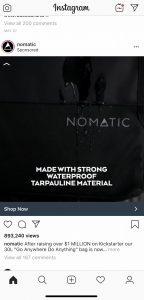——
Are you tired of constantly hearing generic disingenuous bullshit? I sure am. Everybody wants to be “the best”, “the most advanced”, blah blah blah, focusing on glorification rather than to-the-point, elegant messaging.
TL;DR – it’s already emerging and it’s no coincidence that as millennials (and next gens) take over, honesty, conciseness, and directness take precedence over hype, buzz words, and fancy talk. B2B and B2C marketing have to change (and are changing), because it’s starting to be self-deprecating and affect our quality of life. Here are some examples of things I’ve witnessed: themes, people, examples.
——
BTW, this is a meta-marketing post, so not quite your 101 for how to do marketing.
“Welcome to A.I., where there’s an insight for every question, as we work our magic to make you better”. Did I make this up or was it taken from a random website? This BS is the evolution of marketers realizing that relevance requires excitement, and excitement is created through hype, big promises, and fancy descriptions.
Steve Jobs, reality distortion field, and glorification marketing
Steve Jobs was one of the people who had engrained this mindset in us, that talking shit up makes it sell more, and more so, making it the best ever (seemingly, to sometimes realistically imo, not always…) prompted what’s referred to as “reality distortion field”. Jobs was often accused of making people believe that things are one thing, when arguably, they were not really, or far less (or more, if it was a really tough challenge) than what he led them to believe. So much so that Apple employees that were part of product building found themselves being convinced of a somewhat far fetched reality.
While I think Jobs made a tremendous impact on marketing (brand building, category ownership, communities), product (UI, UX, holistic architecture), and innovation (from the first Apple computers to the “i” devices), he also broke the industry to some extent. Now, everything is “phenomenal”, “groundbreaking”, “best-in-class”. Everything is most advanced tech, powered by A.I., M.L., etc. everything is ultimate, just what you need, makes you better.
Substance? Transparency? Authenticity? Ha!
I believe that in 2019 and beyond, marketers will have to dig out of the grave we all dug ourselves into. Obliterate BS, tell it like it is, expose weakness, communicate quickly and effectively, and of course, deliver valuable content.
Ideally, the concept is that I would want to use your offering because I need/want it, not because I was tricked into it. And I want to know that it will likely provide a positive experience.
Some great examples of contemporary (successful) implementation
- Zest
Yam Regev (yam means sea in Hebrew, don’t get excited about sweet potatoes) is a great example of how talented marketers implement this type of agenda, in fact, he’s kind-of pioneering it in that sense. He is the co-founder and CEO of a startup called Zest, which according to their website ”unifies community curation and AI to deliver the upskilling content you need״.
While I don’t know Yam personally, I started following him about a year ago, and just loved his methodological trust building, with those exact same principals: authenticity, transparency, high-value content.
Follow this fella to get inspired on how future marketing should be done, doesn’t matter if it’s b2b or b2c.
Other than of course, that he seems to have a really cool product.
- (Some) Instagram ads
Another great example is how good Instagram advertisers have become. Super concise: after going through the standard ad targeting algorithm, the content itself shows you exactly what you’re prompted to buy, how much it costs, what are its features, and more. Less buzz more directness: what is it? What is it good for? Why should I buy it? Next time you scroll through your Instagram feed, take a moment to explore these ads. Also, it’s super slick, often served in the form of a video ad that doesn’t need sound, subtle clues, over sophistication, and other traditional advertising techniques.

Source: Instagram
Tips
I learned the hard way, that the only way to succeed is to build something useful, and at the same time, apply these principles, which I’ll repeat for your benefit at every step of your marketing efforts:
- Minimize your BS – use as little generic, buzzy words as possible, don’t embellish or over-hype what you do, and if you do, make sure it’s not your elevator pitch. Rather, secondary supportive language.
- Be authentic – share your success but also your failures, your challenges, share inspirational stories
- Say what it is upfront – just say it. What are you selling, why should I buy it? how much does it cost? don’t bait-and-switch, don’t trick me
- Deliver high-value content – don’t just make content for the sake of making content, that happens too often, to the point it’s becoming annoying (think of newsletters, digests, random posts, Instagram’s every-growing content-for-the-sake-of-content).
- Stay away from false promises – if you have a shitty product, focus on making it better. Putting it in the hands of more people would just make it worse for everyone
———-
Marketing of the future should stop making me overwhelmed and suspicious, rather, it should use up my mind space in a non-intrusive, honest, direct way. And it freakin’ works.

